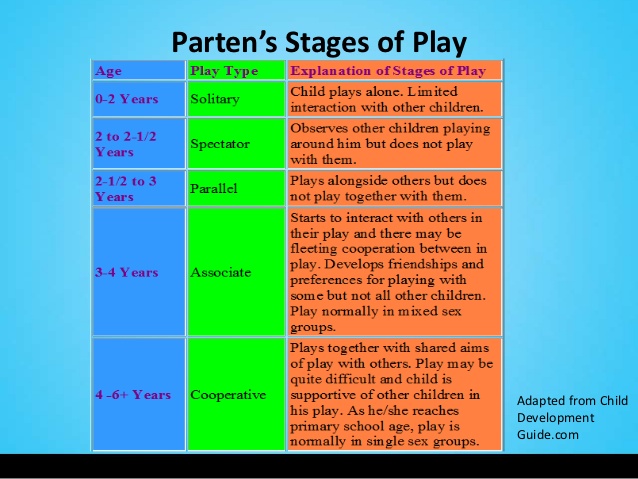Lesson 7: Planning Play

Learning Outcomes
Upon completion of this lesson's material students will be able to:
- Identify the stages of play
- Discuss how to promote play
Teaching
Research has shown that preschoolers who experience child initiated, free choice activities that are supported through intentional play will have better cognitive and language performance at seven years old than same aged peers without similar experiences. Other supporting research shows pretend play strengthens sustained attention, memory, logical reasoning, language and literacy skills, imagination, creativity, understanding of emotions and the ability to reflect on one’s own thinking, impulses, control of own behavior, and ability to take another’s perspective.
According to the American Academy of Pediatrics (2007) “Play is essential to develop because it contributes to cognitive, physical, social, and emotional well-being of children and youth.” Psychiatrists and psychologists are concerned about the raising stress and anxiety levels in children saying, “Limiting free play in kids may result in a generation of anxious, unhappy and socially maladjusted adults.” Another study showed a concern between bullying behavior in adolescents: “Some psychologists are concerned that one cause may be ‘less playtime in kindergarten and pre-school’ where children learn to get along with other children through play experiences.”
Something to think about: So with all this research showing the importance of play: Why is it so difficult to observe sustained play in many preschool setting?
Play as a Curriculum
- Make clear the connection between research to learning and play
- Teaching strategies used to facilitate play need to aid in the same connection
- Create essential planned time for sustained high-level play to development
- While planning this time, remember that this time can allow for child-initiated play: Time to resolve conflicts, problem solve, negotiate with peers, and for children to experience several roles in the play
Acting as Play Facilitators
Educators become facilitators – scaffolding and assisting children, stepping in and out of children’s play. Teachers must be watchful, observing children carefully to know when to get involved and what strategies to use to enhance play. As a facilitator of high level play, preschool teachers can:
- be enthusiastic cheerleaders
- be questioning, challenging or provoking
- be mediators or equipment suppliers
- be a quiet presence nearby, observing, listening, and ready to step in when invited or needed.
- PLEASE notice none of these advocate taking over children’s play
Facilitators:
- Acknowledges what children are saying or doing
- Encourage children’s efforts
- Give specific feedback
- Model attitudes, problem solving and behavior towards others
- Demonstrate the correct way to do something
- Be aware of children’s suggestions and respond appropriately
- It may be the correct way until they show you another “correct” way
- Be aware of children’s suggestions and respond appropriately
- Create or add challenge
- Ask questions that provoke children’s thinking
- Offer assistance
- Provide information
- Give directions
Scaffolding
Scaffolding provides support that helps a child do something that she could not quite do on her own. The help is temporary, only needed until she is confident and skilled at the task attempted. Lev Vygotsky calls this the zone of proximal development (ZPD). To learn more about ZPD, please go to the following link:
As a preschool teacher using scaffolding it is important to
• Know what a child is capable of doing (cognitive functioning)
• Know what supports will be successful (learning style)
• Determine how much challenge is needed
• Know who to pair each child with for greater learning to take place
• Which adult will fit with the child for a positive interaction
Assessment
Lesson 7 Assignment
For each video describe the different levels of play happening.
Be specific when describing the children and what stage of play they are in.
Lesson 7 Discussion
What have you done to promote play (or fun) in your own life, your child’s life, your classroom or your current work site?